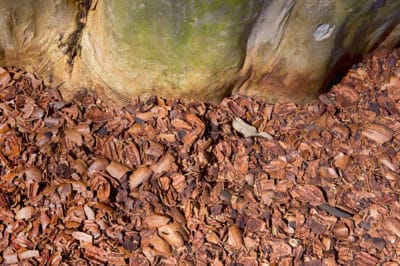Why Mulch?
What about garden mulch drives countless gardeners to replace it year after year, regardless of the cost and labor involved? Mulch:
- Reduces or eliminates weeds.
- Slows soil moisture evaporation.
- Slows soil moisture evaporation.
- Protects soil from severe temperature fluctuations.
- Protects perennials from winter cold.
- Keeps splashing mud off plants and pots.
- Forms a barrier between the soil and ground-sprawling crops.
- Gives garden beds a professionally landscaped look.
Why Pecan Shell Mulch?
As organic mulch, pecan shells offer even more benefits than inorganic ones such as gravel:
- In summer, they extend the life of heat-sensitive crops by cooling the soil.
- When applied in fall before cold weather moves in, they extend the growing season.
- They decompose much more slowly — and need replacing much less frequently — than wood chips or shredded bark.
- By breaking down, they boost soil nutrients and improve soil texture. And because they acidifies the soil, the shells are a great mulch for rhododendrons, azaleas and other acid-loving plants.
- The shells’ sharp edges are a great deterrent to snails, slugs and neighborhood cats who regard gardens as litter boxes.
Expert gardener’s tips: If the mulch has a shortcoming, it’s that fresh pecan shells may attract squirrels scrounging for nut remnants for a few weeks after spreading it.
How to Apply Pecan Shell Mulch
After your seedlings have emerged or your transplanting is done, spread your pecan shell mulch in a 2- to 3-inch layer over your entire garden. Keep it from touching the seedlings or it could trap moisture around them and cause damping off disease.
Mulching Container Gardens
For container gardeners with no access to pecan trees, a coffee grinder or food processer will turn the shells of store-bought nuts into attractive mulch minus the jagged edges.
The Juglone Factor
As hickories (Carya spp.), pecan trees produce juglone, a compound toxic to many other plants. The juglone is most concentrated in their leaves, which explains why almost nothing grows beneath the trees unless the leaf litter is promptly removed. The amount of juglone in the shells, however, is too small to prevent their use as mulch.
